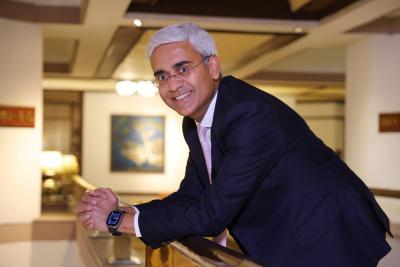Maybank’s Alvin Lee Sees Huge Opportunities and Challenges across ASEAN’s Dynamic Markets
The world of wealth management and private banking in Asia is constantly evolving, and private bank leaders today are facing a very different and complex geo-political environment as compared to a year ago. The Hubbis Digital Dialogue discussion on July 21 brought together a panel of experts who specialise in the region to analyse the current environment, to consider the key challenges ahead, and to discuss the best business strategies for future growth and profitability. They addressed questions such as their vision for wealth management in Asia, the key opportunities ahead, the evolving needs of private clients, differentiation and the value propositions, the hunt for talent, the need for digital excellence, as well as the shifting competitive environment. Alvin Lee, Head of Group Wealth Management & Community Financial Services Singapore at Maybank, was one of the experts to offer delegates valuable insights into the opportunities and major challenges of delivering wealth management across the dynamic emerging economies of ASEAN.
Alvin opened his commentary by offering delegates a quick snapshot of Maybank’s wealth business, and shared that the bank remains focused mainly on Asia, with the regional head office in Malaysia. Maybank has the unique advantage of being the only bank which has a wide presence in all the 10 ASEAN countries.
A vast market with great potential and opportunities
“ASEAN has more than 650 million people and its combined GDP would rank the region as the world’s fifth largest economy,” Alvin reported. “I run the wealth management business for the Group, and we address our wealth management business across different segments - from retail to high net worth, as well as beyond the region.”
He commented that while private banks tend to concentrate on the high-net-worth (HNW) and ultra HNW market segments, Maybank, as a leading universal bank, places equal emphasis on its mass and emerging affluent segments in the region where more personal wealth is being created and is growing.
Alvin added, “It is about the wealth continuum. And with our extensive network across ASEAN, we can really mine deeply into this customer base, while serving the HNW and upper echelons of society.”
“This is a profitable segment, and gone are the days when the products offered at the premier banking level are simply plain vanilla. In fact, with growing consumer sophistication, some of what used to be confined to the private banking space are now made available to the premier segment as well.”
He also noted that Maybank is involved in the democratisation of access to wealth management products, advice and services in what is a remarkably dynamic and diverse region. “Additionally, we see that our customers are increasingly international, increasingly savvy, and keen to diversify their wealth. The opportunities are enormous.”
Vast experience in the banking industry
Alvin’s perspectives come from the very considerable experience he has built up in his career. Today, he is responsible for Maybank Group’s wealth business across the private banking, mass affluent as well as emerging affluent segments. The Maybank wealth business spans eight countries and has over USD90 billion in combined AUM.
Alvin has over 20 years of banking experience across wealth management, corporate, consumer banking and treasury, with specialisations in product and risk management, as well as business development. He started his illustrious career at JP Morgan, and thereafter moved to gain international work experience in Asia, Europe, Africa, and the Middle East.
Prior to taking up his role at Maybank, he worked at Burgan Bank in Kuwait as a consultant to the Chief Executive Officer, managing the bank's Treasury function as well as its proprietary investment portfolio in fixed income, fund, and private equity. He also spent 14 years with Citibank and four years with Barclays in London.
“Road bumps” to growth
Alvin also offered delegates at the July 21 discussion some notes of caution, pointing to the road bumps that all players will face. One of the challenges is the competition for talent across the board, not merely for the Advisor/Relationship Manager roles, but also across various roles in operations and support functions, technology, and compliance.
“Attracting and retaining talent is a problem faced by all players,” he acknowledged. “Additionally, we also need to stay abreast of regulations, as well as contend with the intensifying competition from non-bank players and new entrants.”
The right balance
Alvin further gave some insights into how Maybank positions its RMs and advisors. The bank aims to balance the need to deliver the right service level against productivity. With customer-to-RM ratios ranging from a few hundred in the emerging and mass affluent segments to about 50-70 in the HNW segment, leaders need to provide tools such as efficient KYC processes and digital capabilities to enable the RMs to attain that balance of service and productivity.
“This is far from easy,” he conceded, “especially with a shortage of talent and experience in the market. But we must strive for that balance between giving what customers need and want, and achieving that with optimum efficiency. And that's where technology comes in.”
He elaborated on those views, noting that as products offer little or no differentiation, it is critical that outstanding service level is provided as this matters most to customers.
Delivering on promises
“Yet while that is true,” he said, “it is still tough for the RMs to focus on that service all the time, because this industry still requires our RMs to meet their financial KPIs which are their monthly targets. However, at Maybank, we strive to focus our efforts on genuinely delivering that level of service, that attention to their needs and expectations, and certainly not simply paying lip service to this concept.”
Alvin added that Maybank regards customers as belonging to two categories. One category is the typical client seeking typical wealth management solutions, and the key differentiation factor is the bank’s ability to generate returns above the benchmarks and deliver seamless ease of transacting with the bank.
The second category is that of the very wealthy clients, including the UHNWIs, whose needs are far more complex. They need to be approached and serviced with a more detailed and insightful mindset, and it is important to know and understand their lifestyles such as where they might reside, what their cross-border requirements are, and how they have diversified their assets across the globe.
The right culture
Alvin also offered a comment on the value and delivery of advice, which he said comes from the collective effort and culture of the bank, and should not be solely dependent on the RMs. “We need to present the right culture, and we must not be overly focused on short-term revenue goals. We need to extend the KPIs to cover multiple quarters if not years, and try to look at the RM performance over time rather than a discrete period of time,” he explained.
Staying close, staying relevant
He also said that he continually stresses the need to offer to handhold customers through periods of financial or global anxieties, helping them build diversified and robust portfolios that are well-balanced at home and, increasingly, overseas. “To stay relevant in the market, we need to continue to invest in our people, systems, leveraging digital and other means to become more customer-centric as well as more efficient,” he added. “And never lose sight of the fact that private banking is predominantly a people business, based on trust and relationships.”

More from Alvin Lee, Maybank
Latest Articles







